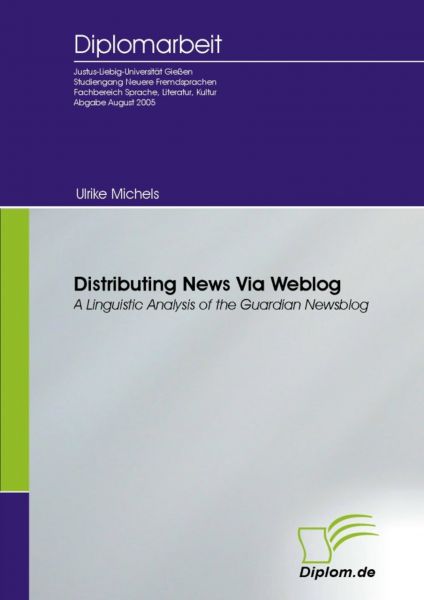Distributing News Via Weblog - a Linguistic Analysis of the Guardian Newsblog
Inhaltsangabe:Abstract:
This study investigates in how far the news language of weblogs differs from the news language in traditional print or online newspapers. A special focal point is set on oral language and its functions.
The analysis should help to answer the questions:
- Can weblogs help to minimize the distance between journalists and readers?
- Can weblogs assist in attracting a new kind of readership?
- Can weblogs assist in raising readership loyalty?
All results can also be transferred from journalism to public relations and marketing:
- Can weblogs help to provide you closer insight into your customer needs?
- Can weblogs assist in attracting new target groups?
- Can weblogs assist in raising customer loyalty?
The study is set up according to the following sequence:
Firstly, a general approach to weblogs is presented, describing their structure, development and implementation. Secondly, differences between the spoken and written mode are outlined and several models depicting the continuum relationship between both are introduced. After the explanation of the significance and function of orality in written electronic and news discourse, the concept of oral models in the press is introduce. In a last step, a sample analysis of several articles from one journalistic weblog is conducted, one online and one traditional newspaper, applying a linguistic framework based on the theoretical works presented before.
With this examination, it is shown that the language used in journalistic weblogs contains more characteristics from the variety of spoken language than the languages of online and traditional print newspapers. From the results, potential effects are derived, e.g. on the practical fields of application or on the composition of the readership.
Until now, only 38% of all adult US internet users and 37% of the Germans know what a weblog or short blog is. But nevertheless, weblogs have already attracted great attention from around the globe during the past nine years since their first appearance. In September 2004, Time asked „Is this a media revolution?” Initially, bloggers pointed their readers to interesting sites they found on their travels in the World Wide Web. Later, this filter function was used primarily to comment and criticize media coverage of news. Thus, bloggers were claimed to be the „antithesis of traditional journalists: unedited, unabashedly opinionated, sporadic and personal”. This personal aspect was […]
Inhaltsangabe:Abstract:
This study investigates in how far the news language of weblogs differs from the news language in traditional print or online newspapers. A special focal point is set on oral language and its functions.
The analysis should help to answer the questions:
- Can weblogs help to minimize the distance between journalists ...
Versandkostenfreie Lieferung! (eBook-Download)
Als Sofort-Download verfügbar
- Artikel-Nr.: SW9783956360121
- Artikelnummer SW9783956360121
-
Autor
Ulrike Michels
- Verlag Diplom.de
- Seitenzahl 145
- Veröffentlichung 07.06.2006
- ISBN 9783956360121
- Barrierefreiheit Aktuell liegen noch keine Informationen vor
- Verlag Diplom.de

